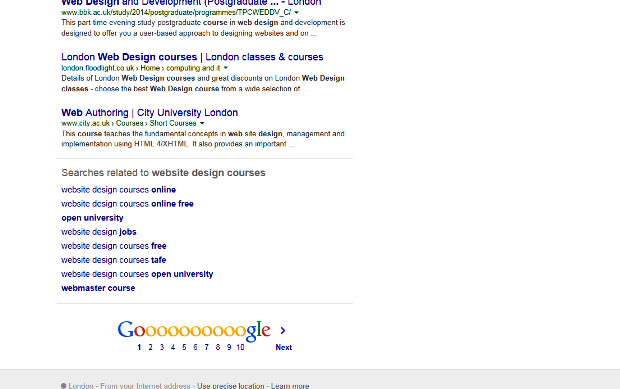I’ve pointed out in the past that a quick and easy way to find out what people are searching for is to use Google Instant. That’s the little tool on Google that shows results as you type. You’ll already have it – you just need to make sure it’s switched on under your preferences.
It’s very general and doesn’t show actual search levels, but you can at least be sure that a reasonable number of people somewhere are searching for that term.
To try it, just go to Google and type something in. Let’s say you’re interested in website design . Here’s what comes up (at least on my browser) when you type in website design:
Straightaway, you have the four most common searches associated with that prefix in your locality.
Now you can refine it a bit further. Perhaps you’re interested in website design courses, so let’s search for that.
Here’s what you come up with:
Then you can refine it still further. A good way to do this is simply to go through the alphabet: “website design courses a…” gives you Auckland, Adelaide and At University’. Do the same for b, c, d and so on.
Remember, you’re not doing the actual search, just looking to see what comes up as you type, so it’s very quick. Only actually search for something when you find something relevant.
When you do search, here’s something else useful. Related searches will appear at the bottom of the page. Like this:
Now for the second useful free keyword tool: www.ubersuggest.org. Once you’ve got an idea of your keyword terms from Google Instant, simply go there and enter them and it will give you a list of suggested related terms.
Finally, the third free tool: Google Keyword Planner.
Now you know what to search for, you can find out the actual search levels. The good news is that these are more accurate than they used to be, although remember that some searches will be from people just checking out the competition or mulling over keyword terms, rather than people actively looking for what they’re searching for.
Of course, until about a year ago, it was all much easier – the Google keyword tool would automatically give you search levels for related terms, and you didn’t need a Google account to use it either.
But at least this way it’s still free. And unless you’re in the SEO business yourself, or you really need in-depth knowledge and certainty about keyword terms, it’s all the tools you need.
For further details on writing for the web, please see my SEO copywriting and my website copywriting for small businesses pages.











